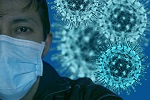
There is a dangerous misconception out there concerning repeat infections with COVID. Early during the pandemic, some people believed that infection with COVID would lead to superior protection from reinfection from the virus. Some politicians advanced this view, all without the benefit of any data. Some people who were vaccinated with the original series of immunizations and boosters also believed they were invincible. They thought that even if they were re-infected, their immune systems would completely protect them from serious illness. Well, data is beginning to accumulate that COVID is more sneaky than we thought.
With the more infectious new variants, re-infection rates rose. Some people are on their third or fourth COVID infection, or even more. The virus that causes COVID is evolving rapidly, and with so many people getting sick, it has the ability to mutate and change to get better at making us sick. The COVID variants are getting good at evading the immunity we have from infection by a previous virus or the vaccines. The flu virus also evolves and can evade the immunity from previous infections or vaccines, which is why we need a new shot each year.
Generally subsequent infections are milder, with about a 3% chance of serious or fatal infection. However, a pattern is emerging that each re-infection may set you up for more serious issues. It looks like damage done with each COVID infection is cumulative, each one raising the chances that you could develop other serious medical issues. A recent study showed that multiple COVID infections can increase your risk of dying from other causes, and can also lead to disorders involving your heart, blood, brain and lungs. Multiple infections can also lead to diabetes, chronic fatigue or long COVID. We need much more research on these relationships.
Current data show that vaccinated people are half as likely to develop long COVID than unvaccinated people. Even if they are vaccinated though, people who have multiple infections are more likely to develop long COVID. We still do not understand what causes long COVID. Right now, scientists think that it might be that the virus hides somewhere in the body after infection, keeping the immune system in an active state. It may also be that COVID infection prevents the regular function of the immune system from re-establishing itself after infection, or perhaps there is some autoimmune function that is activated. Others think it is just a matter of chance: one of the times you are infected with COVID happens to be the time it establishes the state that leads to long haul symptoms.
Add to this the fact that more infectious virus variants have emerged, and they are capable of serious disease. We have a way to go before we understand this virus that made the jump from animals to humans. Unfortunately, we are likely to experience this movement of virus from animals to humans again and again. COVID will not be the last of these viruses to affect our lives.
More Information
Getting COVID-19 Multiple Times Is Risky for Your Health
t this point in the pandemic, it's easy to think of COVID-19 as something closer to the flu than a dangerous disease. But even though the latest Omicron variants do cause less severe symptoms than the original strain of SARS-CoV-2, COVID-19 is still far from a typical disease-especially if you get it more than once...
Reinfections and COVID-19
Reinfection with the virus that causes COVID-19 means a person was infected, recovered, and then later became infected again. After recovering from COVID-19, most individuals will have some protection from repeat infections. However, reinfections do occur after COVID-19. We are still learning more about these reinfections...
Acute and postacute sequelae associated with SARS-CoV-2 reinfection
A large body of evidence suggests that first infection with SARS-CoV-2 is associated with increased risk of acute and postacute death and sequelae in the pulmonary and broad array of extrapulmonary organ systems1,2,3,4,5,6,7,8. However, many people around the globe are experiencing repeat SARS-CoV-2 infections (reinfections)...